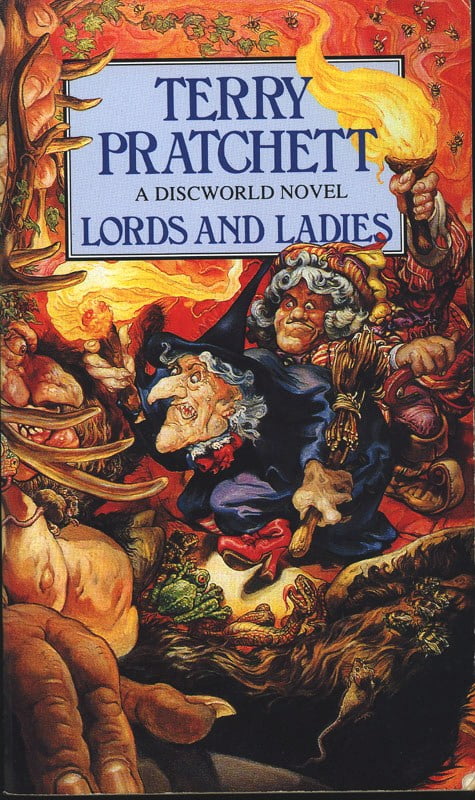From time to time I talk about Discworld books, and I will usually say that there’s no reading order. I operate on the assumption that readers have a degree of object permanence, that they are capable of telling if a story happens before or after sometihng and that if you find a story of a character that includes a former drunk in one book, and then find a story of a drunk in another book, you will be able to put the sequence of events in a meaningful order without being overwhelmed by the challenge of the book. The Discworld books are contained stories for dedicated readers capable of managing the complexities of understanding that I could reach when I was twelve years old and in a cult, I do not doubt any adult curious about them will do fine without an authoritive reading list to ensure they do not miss any of the lore.
But.
Ugh I hate that.
But but but but. But! There is a single Discworld Book that I know of (now) which opens with an author’s note that you need to be at least a little bit aware of previous stories in order to appreciate the events of this book. And then it tells you those events.
If I did this more often, I imagine I’d introduce these things by hey, let me tell you about my favourite Discworld book. But let’s do that anyway. Don’t worry, no major spoilers, just a sort of vague gesturing at the plot that’s already covered by the book jacket.
Lords and Ladies is a story of the Discworld, set in the kingdom of Lancre, about the characters of the Witches; Granny Weatherwax, Nanny Ogg, and Magrat. Granny is a stern, hawkish woman who has all the makings of a grand and powerful force, a queen in waiting, and too obstinate and selfcentered to ever dare to let that happen. Nanny Ogg is like if that one raunchy grandma stereotype was scrutinised down to the ground, and Magrat is what a lot of people in the 90s really were when they imagined themselves to be ‘wytches.’ This character dynamic, in addition to fulfilling the classic Sonic/Shadow/Tails dialectic, also presents the reader with an opportunity for a rare thing in the Discworld in that it’s a very big story set in a very small place.
Lancre is nowhere. Lancre is a British Midlands vision of a Fantasy Kingdom That’s A Bit Like The British Midlands. It is mountainous and hilly as conceived by a country with literally no mountains on it, so they have the prevalence of a little kid’s drawing of a map. Its castle teeters, its people are all rural workers with probably no flat land to grow crops on and they drink a foul alcohol that is made out of apples.
Well, mostly apples.
Lancre is also ground zero for the invasion of a parasitic universe, a dimension that does not have the ability to ‘properly’ sustain itself, and from which flood its own native dominant species, a predatory humanoid perfectly suited to the consumption of Lancre’s own dominant species. There’s a repeated theme in Pratchett’s work of humans as entities in an ecosystem – it was something he played with in Reaper Man with the Maul. Now, seeing the presence of a multi-layer shopping body that displaced all local businesses in the name of consolidation and rent-seeking as some sort of parasitic creature that needed to be addressed through the presence of a violent, repelleing antibody could be seen as a suggestion of the validity of anticapitalist terrorism,
The story of Lords And Ladies is in the tradition of the Discworld narrative one where the author picks up on an existing idea from another fantasy convention and decides to grapple with it in the specific idiom of the Discworld. This requires a deeply aware consideration of the fantasy genre as a whole and the storytelling tropes that underpin that genre. In Reaper Man the idea of the cosmic meaning of a figure of death was the centerpiece. In Thud there’s a serious consideration of intractable fantasy grudges between dwarves and trolls. In Unseen Academicals, it’s Orcs.
Lords and Ladies is the Discworld take on elves, which at the time I read it, was a real shock to imagine that someone might not like elves. After all, Elves are like humans but cool and exotic, right? Why would an author not use elves as a chance to show something cool and a different, uh, uh, do I have an alternative to exotic, guess I don’t, an exotic other culture!
It’s truly embarrassing to consider with the benefit of hindsight, how much ‘elf culture’ is just ‘what white guys think even whiter guys would be like.’
I don’t really get paganism. Not properly. I like paganism; I like the invocation of a time before Christianity, a reminder that cultures do not die, they are killed, and that before my identity was wallpapered over by three layers of colonial dictation, there is a line that reaches from who I am back to people who would make up stories about horse skulls that sing cruel poems, and that that is more real to me than the political conveniences of a Roman emperor. I find it in the edges of things; of characters who evoke reminders that there were things before Christ’s God, and that there were things better than America’s Christ.
Lords and Ladies is some fantastically pagan stuff.
If you’ve not read the book (and I recommend it, I like it a lot), the cover sometimes gives away one major event of the book, showing a character standing before a slumbering, slouched, enormous humanoid form with antlers. In the ending of Narnia books, I remembered a description of a giant, of something enormous, standing over the waters before finally settling down into sleeping, that when the great book of Narnia closed, it closed on a frozen sea with someone sleeping inside it. It stands to reason in my mind that there is a shape of something giant in the historical memory. That there is something that we know, at the end of days, there will be there, standing on the horizon, as we watch our last days end.
I don’t think there will be but I think it’s real cool to use it as a visual metaphor for your time is over. Something about the wrongness of the scale, of looking up at the sun and seeing it blink, that kind of thing.
In Lords and Ladies, the witches explore these things. Why are there standing stones. What are they for. How do they work. Why should they work that way? Do you need to understand what it is to work for them to work? Are old practices inherently wrong? Are they weaker for us trying to understand them?
All told in the confrontation between a thing that sleeps, until it doesn’t have to any more.
I think Lords and Ladies has one of my favourite examples of weaponised pronouns in a story. Every elf in the narrative outside the King and Queen are referred to not as he or she or they, but instead as it. The Elves are not people with personhood as we understand it and they would not see you or me as people with personhood either. They do not consider us as entities and do not see our individuality as a thing to explain or explore – just as much as they do not consider their own individuality as meaningful to us.
There is no misgendering an elf, because an elf is not a thing that has gender or a social identity. Elves are stories. Elves are cruel and dark stories, stories about things that are Just So and rituals performed out of fear of consequences that are made up until they are very much very real.
Lords and Ladies is one of my favourite Discworld books because of how much of it is about righteous violence agianst a relentless, abusive invader. There is no ‘ah, but we have won, so we need to be the bigger and more morally appropriate people’ here. This is a story where an invading queen gets punched in the face and axed in the gut. In a very pure way, this is a story about what happens when a dehumanising colonial force arrives to consume your past and future for its own individual enrichment and what it’s worth doing to protect yourself from it, about what violence in even the meekest it incurs.
Even the blind and meek and voiceless have gods.



